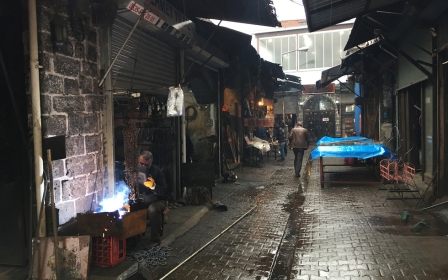'Ludicrous': AKP slams fears of stronger Turkish president

ISTANBUL, Turkey – A spokesman for Turkey's ruling party has hit out at critics of a proposed executive presidency that is being put to voters on 16 April, saying the party remained committed to its basic principles of democracy and human rights.
Yasin Aktay, deputy chairman and spokesman of the Justice and Development Party, or AKP, criticised domestic and international concerns that the party has veered off its commitment to individual rights and democratic reforms.
"This claim is ludicrous," he told Middle East Eye, saying that such claims were nothing more than propaganda being employed by the West.
Aktay argued that the current constitution only serve to keep democratically elected politicians under the thrall of non-democratic forces.
Checks and balances
"It is clear to see that institutions set up to serve as mechanisms of checks and balances are not modern and only serve to ensure the perpetuity of non-democratic forces."
He said a memorandum issued up by the military on 28 February 1997, which laid down demands of the then government and sparked its downfall, had "horrific consequences" on the Turkish political process that the new constitution would rectify.
"In this country, the 28 February process was considered a checks and balances mechanism. The constitutional court tried to shape politics with its ruling during the [2011] '367' crisis," he said.
"These and other actions had horrific consequences on Turkey's political establishment."
It is clear that [current] institutions only serve to ensure the perpetuity of non-democratic forces
- AKP chairman Yasin Aktay
The 28 February process refers to the document issued by the military in 1997, in which it listed its demands of the incumbent government and which led to the government's downfall.
During the so-called 367 crisis in the 2011 presidential elections – the last time a Turkish president was elected by parliament – the opposition Republican People's Party (CHP) boycotted voting sessions thereby making it impossible to have the quorate 367 MPs in session, a requirement to elect a president.
After months of limbo, the AKP candidate, Recep Tayyip Erdogan, was elected president when the Nationalist Movement Party (MHP) dropped its objections and attended the session allowing the 367 mark to be passed.
According to Aktay, the executive presidential system would "shut the door on such crises, to remove duality in leadership, to further strengthen stability and trust and to introduce modern mechanisms of checks and balances".
Presidential powers
Aktay also took aim at those he said were attempting to muddy the waters by seeking to portray the switch to an executive presidency as a project of the AKP and Erdogan.
"We also notice that they [critics] try to say that fears of increasing dictatorship are growing and that the president will use his power to issue decrees to limit the scope of parliament's activities and even cripple legislative activity as a whole. But none of it is true."
"What is being voted on 16 April is an administrative system that has been the topic of debate in Turkey for a long time now," he said.
"It has always been an issue that the centre-right wanted to address going back to the time of Turgut Ozal [a former prime minister and president until 1993]."
The constitutional amendments being voted on vastly expand the president's powers.
"The president can issue decrees concerning his executive role, but he cannot issue decrees on the basic rights, individual rights and responsibilities and political rights and responsibilities," said Aktay.
"Even then, apart from six executive areas, any law passed by parliament supersedes presidential decrees."
The six areas, according to Aktay, where the president has sole responsibility are:
- To appoint and dismiss vice presidents, ministers and high-level public officials
- To create ministries or alter the structure of existing ministries
- To determine the structure and scope of the National Security Council secretariat (the top security body in the country)
- The creation of public legal entities (state-founded, financed and run bodies basically)
- To appoint the chief of general staff of the Turkish armed forces
- To appoint the State Audit/Supervisory Council (for auditing/supervising state bodies and institutions other than the military and judiciary).
He said many Western countries also bestowed similar executive powers and that it represented a very modern system. To claim that such a system damages human rights runs "contrary to common sense," said Aktay.
Political stability
Aktay also ruled out any suggestions that the party was weakening itself by backing the abolition of a parliamentary system and said the shift "will provide a more streamlined role for political parties".
"What needs to be clear is that this shift is not for the AK Party or Erdogan. The political stability of the last 15 years is not the result of the system guaranteeing such stability. It is the result of the AK Party's endeavours under the leadership of Recep Tayyip Erdogan," said Aktay. "Recep Tayyip Erdogan doesn't need this change for himself. It is a change for the future."
In defence of a shift to an executive presidency system, Aktay pointed to the period between 1960-1980 where he said 21 governments were formed and a succession of weak coalition governments meant the country stagnated and lurched from one economic and political crisis to the other.
Last July's failed coup attempt was a vital indicator of the need for a Turkey governed by a strong executive and a strong legislature, according to Aktay.
"Turkey was faced with an attempted occupation and the nation repelled this attempt under the leadership of Recep Tayyip Erdogan. It became crystal clear how an attempt was made to push Turkey to the cliff's edge by various domestic and external alliances," he said. "It was this that led MHP chairman Devlet Bahceli to give the green light to start talks on constitutional changes."
Bahceli, who in the past was unequivocally opposed to the AKP's plans for an executive presidency system, crucially declared his backing for the change after the coup attempt. The MHP, which was already split, became even more fractured as a result of his decision.
Aktay stressed that the proposed change was not intended to weaken or strengthen any particular group or bloc.
"This change will result in a much healthier distribution of responsibilities in decision-making mechanisms. It will result in a more balanced and stable distribution of responsibilities."
New MEE newsletter: Jerusalem Dispatch
Sign up to get the latest insights and analysis on Israel-Palestine, alongside Turkey Unpacked and other MEE newsletters
Middle East Eye delivers independent and unrivalled coverage and analysis of the Middle East, North Africa and beyond. To learn more about republishing this content and the associated fees, please fill out this form. More about MEE can be found here.




